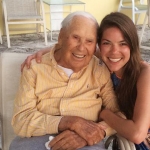News
Kiki Kazickas, granddaughter of Dr. Joseph and Alexandra Kazickas, (or Tėvelis and Mamytė, as Kiki and other ten grandchildren kindly call them) is continuing her grandparents' philanthropic work. Two of her choices she feels very passionate about - Education Opportunities for All and Women's Reproductive Rights. Kiki chose to support the Pencils of Promise and the Center for Reproductive Rights.
"Pencils of Promise" raises money to open schools and increase literacy rates in developing countries. To date, organization has built 342 schools across Ghana, Guatemala, Laos, and Nicaragua. “What I find particularly inspiring about this nonprofit,” Kiki shares, “is that they only hire educational leaders from within the countries they are serving. This means all leadership is local, so children are often learning and connecting with teachers of a similar background as themselves. As well, 100% of a donation to Pencils of Promise goes directly to providing education.
I've always had an interest in exploring the world and traveling...not to add a country to my "list", but to give myself the opportunity to immerse myself in another culture, to learn from the people I meet and to hopefully positively influence them as well. In college I volunteered with Peacework Development Fund in Vietnam. A select group of Wake Forest students and I were in a small village in southern Vietnam rebuilding a grade school that was destoryed by a recent flood. We were the first white people to ever stay in the village. The experience was humbling both for me and the Vietnamese college students we partnered with on the project. Through Wake Forest and the Peacework Development Fund we were able to give back and help improve the lives of the less fortunate. We also were given the oppprtunity to engage in a culture exchange were both the Vietnamese community and small group of Americans were able to grow from their interactions with one another. For many Americans it is eye opening to visit a developing country and see how others live. Vice versa, I think it's very important to show the world how compassionate and giving young American students are, how dedicated we are to helping others both in our own country and abroad. I've been blessed with the ability to travel for educational purposes and for pure pleasure, but some of the adventures I remember most fondly are the ones that I was able to help and interact with the local people, whether through a formal volunteer program or as a natural add on to one of my trips. I gain more out of befriending locals than visiting touris sites. For example, some of the things I remember best from my six weeks in India are the conversations I had with the locals and the relationships I formed with them. That is truly one of the best things that Mamyte and Tevelis gave me. They instilled in me the desire to explore the world, to travel with an open mind and open heart, and most importantly to be gracious to every person I meet regardless of their means or background. The world is small, we must embrace each other with love and peace.
I chose to support the "Center for Reproductive Rights" as I think this is a very critical time for women and female rights. Although our world is progressing scientifically and technologically, women across the world still lack access to the basic right to control their own bodies. As the topic of access to abortion and birth control is at top of mind for many Americans, I began to think about this issue on a global scale. I was particularly drawn to the topic of reproductive rights as the Zika virus became an everevolving global news story and the effects of the virus on pregnant women and their babies came to light. Researching the virus and its rapid spread through South America, I was blown away by the fact that there are numerous countries in Central and South America that are advising women to not get pregnant until 2018, but have not granted legal access to abortion. Restricting legal or easy access to abortions and other family planning resources during a time of an international health epidemic is inhumane in itself. Countries and the politicians that run them need to protect their citizens and with the rapid spread of the Zika virus, it has come to light that countries like Brazil, Colombia, Venezuela, and Ecuador are not. As a result, more than 4,000 babies in Brazil have been born with microcephaly as a result of Zika infection. The fact that a woman in Brazil can be sentenced to up to three years in prison for trying to protect her own body and eliminate the chance of bringing a deformed child in to this world is a call that something must change. I align with the mission of the Center of Reproductive Rights as it fights for reproductive freedom by using the law as its driving force. The Center is working to protect women and children around the world and to ensure that governments are living up to their legal obligation to respect, protect, and fulfill those rights. The Center's mission is one that we should all support. Today, through the Center, I signed a petition to call on El Salvador's Ministry of Health to protect reproductive rights in the face of the Zika virus. The Center for Reproductive Rights is an important advocate at all times for all countries. It has helped to support enhancing Lithuanian women's access to health care in 2008, along with ensuring the National Family Policy was a sound legislation for reproductive rights in Lithuania”.
Photo: Kiki Kazickas archives

